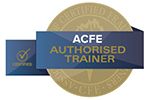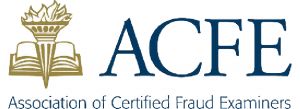Fraud Risk Management – official ACFE training
In this official 2-day ACFE Fraud Risk Management training you will learn how to integrate anti-fraud initiatives into the risk management program of your organization. You will earn 16 CPE credits for your CFE recertification.
With the training Fraud Risk Management you obtain 16 CPE credits (including 2 Ethics credits) for your Certified Fraud Examiner (CFE) recertification!
Fraud Risk Management – mode of study
Option 1: 2-day training (in-class and live online)
Option 2: In-house training (in-class and live online)
IMF Academy – ACFE authorized training organization
 IMF Academy is an ACFE authorized training organization and the exclusive provider of CFE (Certified Fraud Examiner) trainings in the Benelux.
IMF Academy is an ACFE authorized training organization and the exclusive provider of CFE (Certified Fraud Examiner) trainings in the Benelux.
Organizations lose an estimated 5% of their annual revenues to fraud
With organizations losing an estimated 5% of their annual revenues to fraud, the need for a strong anti-fraud attitude and a proactive, comprehensive approach to combating fraud is clear. As organizations increase their focus on risk, they should take the opportunity to consider, enact and improve measures to detect, deter and prevent fraud. Unfortunately, many risk management professionals tend to underestimate the role of fraud in the scope of their professional duties. This training will explain how organizations can integrate anti-fraud initiatives into their risk management programs to:
- Identify, assess and manage fraud risks from all sources
- Support fraud risk management initiatives by establishing an anti-fraud culture and promoting fraud awareness through the organization
- Develop a system of internal controls to address the entity's fraud risks
- Address and respond to any identified instances of fraud
About the ACFE (Association of Certified Fraud Examiners)

The ACFE is the world's largest anti-fraud organization and the premier provider of anti-fraud trainings and education. Together with more than 85.000 members in 160 countries and chapters in 125 countries, ACFE is reducing business fraud worldwide and inspiring public confidence in the integrity and objectivity within the profession.
What will you learn in this official ACFE training?
You will learn how to:
- Identify fraud risks and the factors that influence them
- Develop and implement the necessary components of a successful fraud risk management program
- Identify and implement the elements of a strong anti-fraud corporate culture
- Perform a comprehensive fraud risk assessment across the organization
- Identify financial, transactional, and behavioural indicators of fraud
- Evaluate the fraud risk management program against a maturity model
Who should attend?
Certified Fraud Examiners (CFE) and other anti-fraud professionals; bank and financial institution auditors; controllers and corporate managers; forensic and management accountants; accounts payable and financial analysts; governance, risk and compliance (GRC) officers; internal and external auditors, CPA's an CA's.
ACFE CPE credits
Individuals holding a Certified Fraud Examiner (CFE) certification may claim 16 CPE credits to maintain their certification. You will receive a certificate of completion that includes the number of CPE hours attained to claim participant CPE credits.
Maintaining your Certified Fraud Examiner (CFE) credential – CPE requirements
To maintain your CFE credential, you are required to earn at least 20 hours of Continuing Professional Education (CPE) every 12-month period. Al least 10 of these hours must directly relate to the detection and deterrence of fraud and 2 hours must directly relate to ethics. If you have earned more than 20 hours of CPE in your previous reporting period, you may rollover up to 10 of these hours to meet your current CPE requirements.
With this official ACFE 'Fraud Risk Management' training you will earn 16 CPE credits - of which 2 are Ethics credits - for your CFE recertification.
Prerequisites
We expect you to be familiar with common fraud schemes and risks.
Educational level of the training
The Fraud Risk Management training will be held on a higher educational level.
Also interesting!
You and/or your colleagues might be interested in the following trainings:
In-company
With at least 5 participants an in-house training could be your best option. An in-company training, customized to the needs of your organization, has many advantages and:
- saves you and your colleagues time
- enables you to train in the comfort of your own working environment
- saves travel and accommodation expenses
- can be arranged at a time convenient for you
- sensitive issues can be discussed openly since no outsiders are present
Do you prefer an in-company training? Please contact us for more information. We are more than happy to discuss the various possibilities with you.
Content
DAY I
Fraud risk management – introduction
- Building an effective fraud risk management program requires solid understanding of how and why fraud is perpetrated
- The ways fraud occurs and the impact it has on organizations
- The factors that influence an organization's fraud risks
- Different parties' roles and responsibilities for managing these risks
Fraud risk management – overview
- The risk of fraud is just one of the many types of risks to be managed by your organization, but to let this risk fall out of focus can bring catastrophic results
- The elements of an effective fraud risk management program
- Why businesses should invest the necessary resources to manage fraud risk
Developing a fraud risk management program
- Without clear, defined objectives, a fraud risk management program cannot be effective
- Why some fraud risk management programs are not successful
- The eight steps involved in developing a holistic fraud risk management program
The role of culture and internal controls
- Creating an anti-fraud culture throughout the organization provides an important foundation for the fraud risk management program
- The elements of a strong anti-fraud culture
- Potential obstacles organizations face in fostering this anti-fraud environment
- The role of internal controls as part of the fraud risk management program
- How to design and implement effective anti-fraud controls
Fraud risk assessment – part 1
- The foundation of a successful fraud risk management program is a well-designed and properly executed fraud risk assessment
- Without an adequate understanding of the organization's true fraud risks, any efforts at managing fraud risks might miss the mark
- What makes a good fraud risk assessment?
- How to plan and prepare the organization for the assessment
- Numerous considerations that must be incorporated into the assessment process to ensure the fraud risk assessment's success
Fraud risk assessment – part 2
- A framework for effectively assessing fraud risk across the entire organization
- Walk through the entire process, from identifying the sources and types of risks, assessing the danger they pose to the organization, compiling a complete fraud risk portfolio, and determining appropriate action plans to address these risks
DAY II
Putting the fraud risk assessment into action
- Using a real-life fraud case, practice applying the fraud risk assessment approaches and methodology explored on day I
- Explore how the company's culture, anti-fraud controls, leadership behaviors, and complaint and response protocols all affect its ability to manage its fraud risks
Shaping an anti-fraud culture
- Many organizations avoid open conversations about fraud, but successfully shaping an anti-fraud culture requires bringing fraud into the spotlight
- How to proactively foster an entity-wide anti-fraud culture through policies, hiring practices, employee support and accountability, fraud awareness efforts, and other culture-building initiatives
Proactively looking for fraud risk indicators
- Evidence of fraud often hides in plain sight
- Identify the various ways that the red flags of fraud can appear in an organization
- Analyze both financial and behavioral clues for warning signs that fraud might be occurring
- How to incorporate monitoring for these signs into the fraud risk management program
Monitoring, reporting, and improving on the fraud risk management program
- An effective fraud risk management program includes processes and procedures for monitoring the program's effectiveness and improving the program where needed
- How to measure and report the program's success
- How to make the case for additional support and funding
- A maturity model for assessing and evolving your fraud risk management program
Certificate
All participants will receive a Personal Certificate. Individuals holding a Certified Fraud Examiner (CFE) certification may claim 16 CPE credits - of which 2 are Ethics CPE hours - to maintain their certification.
Trainer(s)

The Fraud Risk Management training is facilitated by an ACFE authorized trainer.
Your trainer is:
Robert Lamers CFE Robert Lamers is an anti-fraud and crisis management specialist and toptrainer of our CFE trainings. He served as a senior corporate anti-fraud officer with NN Group and ING Insurance for many years. Robert is head of European Partnership Development at the Association of Certified Fraud Examiners (ACFE).
Robert Lamers is an anti-fraud and crisis management specialist and toptrainer of our CFE trainings. He served as a senior corporate anti-fraud officer with NN Group and ING Insurance for many years. Robert is head of European Partnership Development at the Association of Certified Fraud Examiners (ACFE).
Start date(s)
The training Fraud Risk Management lasts for 2 days from 09.30 hrs - 17.00 hrs. The training will take place in Amsterdam, The Netherlands (in-class and live online, up to your choice) on the following dates:
- 7 + 8 October 2024
Fee / Registration
The fee of the 2-day official ACFE training Fraud Risk Management is € 1,980 (VAT excl.) per person. The fee includes all lunches, coffee/tea, the official ACFE documentation and 16 CPE credits - of which 2 are Ethics CPE hours - for maintaining your CFE certification (if applicable).


